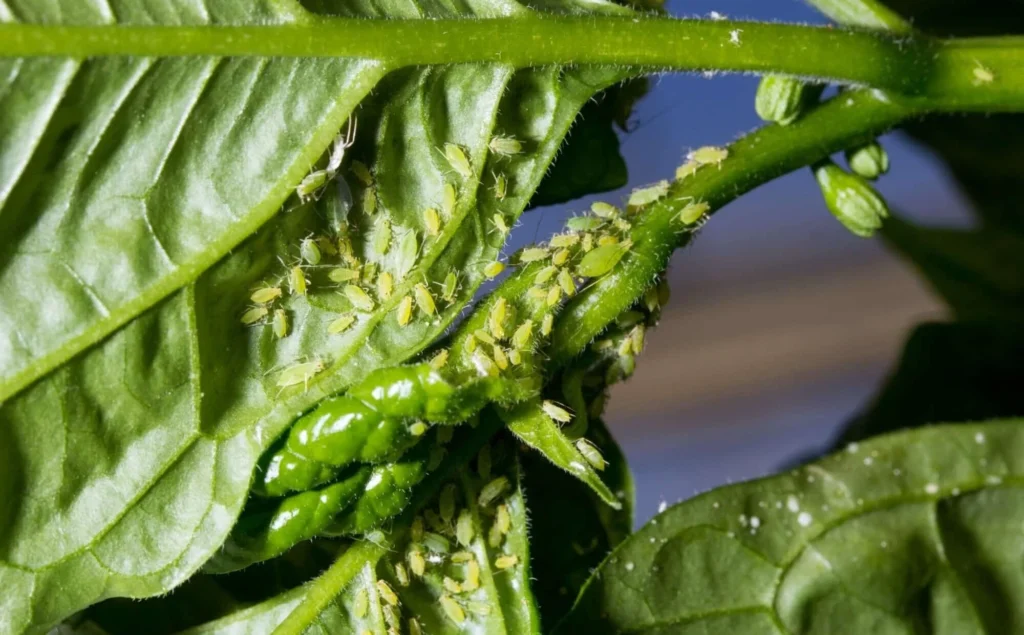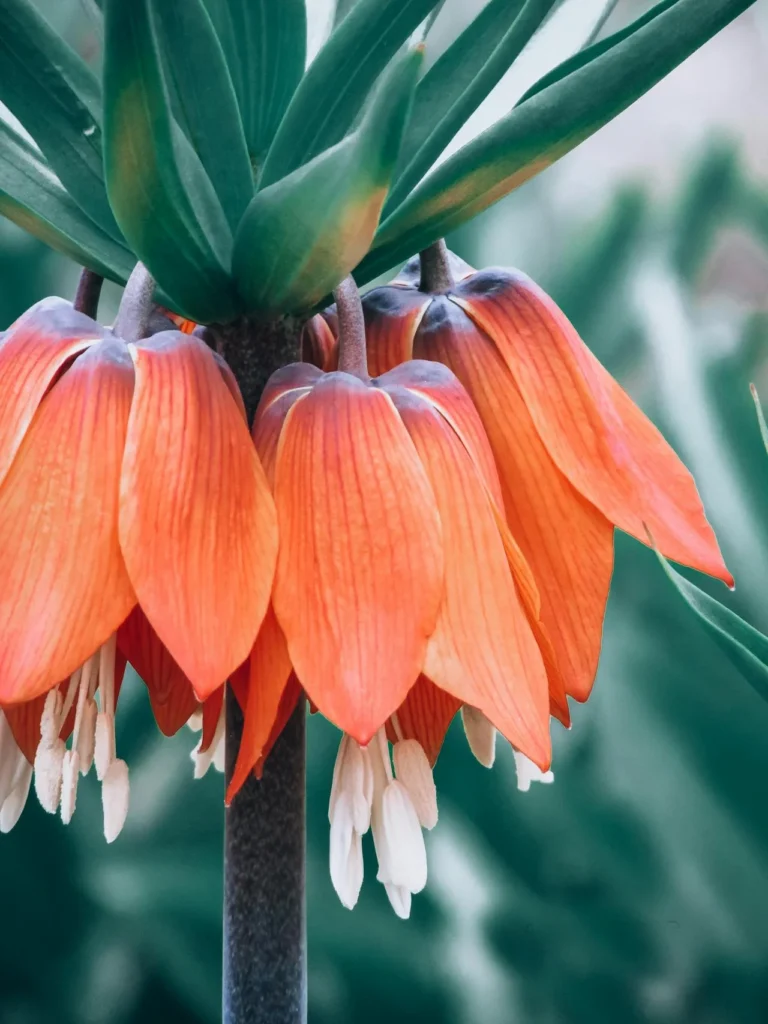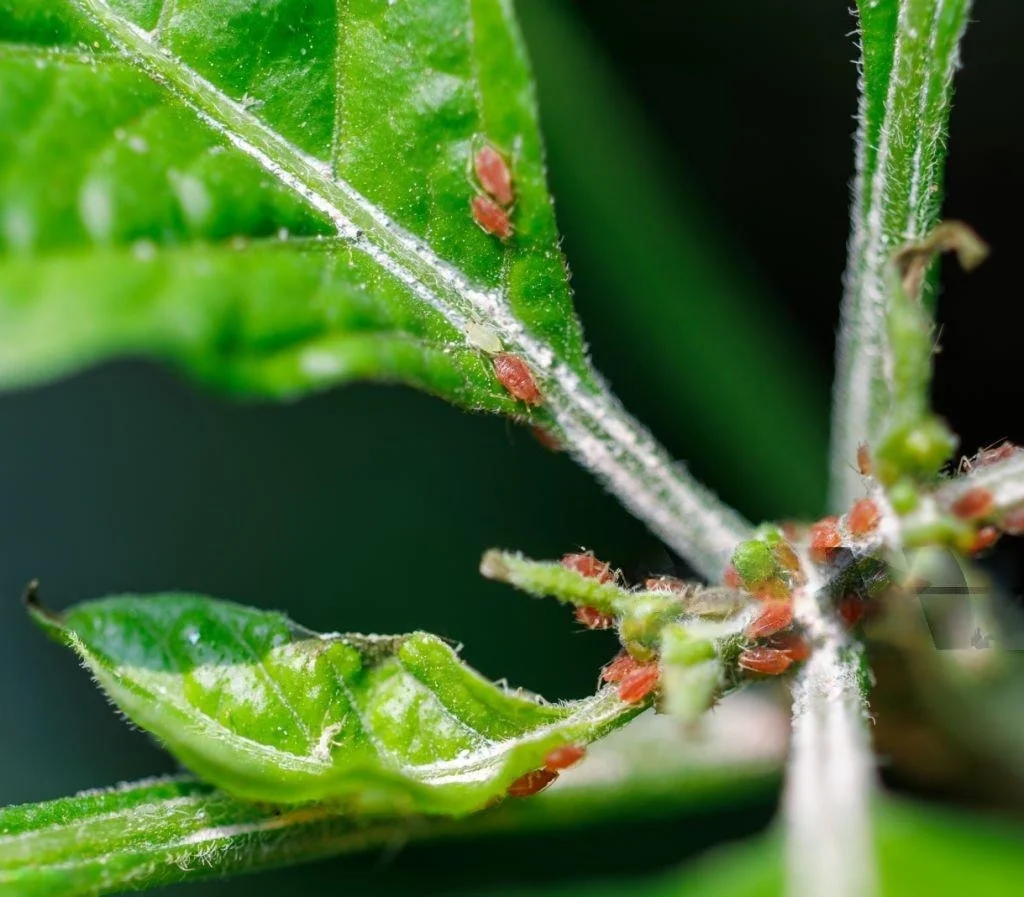Understanding the Aphid Menace: A Chilli Grower’s Nightmare
Oh, honey, let me tell you about these tiny terrors that can turn your chilli dreams into a hot mess! Aphids might be small, but they pack a punch that’ll make your peppers weep. These little suckers (pun totally intended) come in a rainbow of colors – green, black, pink, you name it. They’re like the unwanted guests at your garden party, showing up uninvited and refusing to leave.
But here’s the kicker – aphids don’t just nibble on your precious chilli plants. Nope, they go all out! These pests literally suck the life out of your plants, feasting on the sap and leaving your chillis weak and vulnerable. And as if that wasn’t enough, they’ve got a secret weapon: they reproduce faster than you can say “jalapeño”! Before you know it, your once-thriving chilli patch could be looking sadder than a wilted salad. But don’t worry, girlfriend – we’re about to turn up the heat on these pesky invaders!
Spotting the Invaders: Early Detection Techniques
Alright, plant mama, it’s time to channel your inner detective! Catching these little troublemakers early is key to saving your spicy babies. Keep your eyes peeled for leaves that look like they’ve had a bad hair day – curled, puckered, or just plain sad-looking. That’s aphid damage 101, right there!
But don’t stop at the leaves, darling. Get up close and personal with your chilli plants. Check under those leaves, along the stems, and especially around the tender new growth. Aphids love to huddle in these spots, like teenagers at a mall food court. And if you see ants parading up and down your plants? That’s a red flag, honey! Ants and aphids have this weird symbiotic relationship – the ants protect the aphids in exchange for their sweet, sticky excretions. Gross, right? But knowing this little tidbit might just save your chilli crop!
The Hose-Down Method: Simple yet Effective
Ladies, grab your hoses because we’re about to have a garden party – aphid style! This method is all about giving those clingy pests the boot with a good old-fashioned blast of water. It’s like a power wash for your plants, and let me tell you, it’s oddly satisfying!
Now, here’s the secret sauce to making this work: it’s all in the wrist, darling. You want to use enough pressure to knock those aphids off their feet (do aphids even have feet?), but not so much that you’re giving your chilli plants whiplash. Aim for the undersides of the leaves where these sneaky pests like to hide. And remember, consistency is key! Make this hose-down a regular part of your garden routine, like your weekly face mask or wine night with the girls. A quick spritz every few days can work wonders in keeping those aphids at bay. Plus, it’s a great way to cool off on those scorching summer days – multitasking at its finest!
Harnessing Nature’s Pest Control Squad
Okay, plant lovers, it’s time to call in the cavalry! Mother Nature has gifted us with some seriously badass aphid assassins, and we’re going to roll out the red carpet for them. I’m talking about ladybugs, lacewings, and other beneficial insects that make aphids their personal all-you-can-eat buffet. These little warriors are the unsung heroes of our gardens, swooping in to save the day without asking for a thing in return (except maybe a cozy place to hang out).
So, how do we get these garden guardians to stick around? Well, it’s all about creating a five-star bug resort in your backyard! Plant some flowers that these beneficial insects love – think marigolds, cosmos, and daisies. It’s like setting up a dating site for good bugs! And while you’re at it, ditch the chemicals. Those harsh pesticides are like kryptonite to our superhero insects. Instead, focus on creating a diverse, welcoming environment. A little messiness can go a long way – leave some leaf litter and bare soil patches as hiding spots. Before you know it, you’ll have a thriving community of natural pest control experts working ’round the clock to keep your chilli plants aphid-free. It’s eco-friendly, effective, and honestly, pretty darn cool to watch!
DIY Organic Solutions: Kitchen Remedies for Aphid Control
Alright, my crafty queens, it’s time to channel your inner kitchen witch and whip up some aphid-busting potions! Who knew that the secret to saving your chilli plants was hiding right in your pantry? First up, let’s talk about insecticidal soaps. Don’t let the fancy name fool you – this is something you can totally make at home. Mix a tablespoon of gentle liquid soap (think castile soap, not your dish detergent) with a quart of water, and voila! You’ve got yourself a spray that’ll make aphids run for the hills. It works by breaking down their soft bodies – kind of like how a good face wash dissolves makeup, but way less glamorous.
Now, let’s spice things up with some neem oil action! This stuff is like the Swiss Army knife of organic gardening – it repels pests, fights fungal infections, and even gives your plants a nice shine. To use it, mix a teaspoon of neem oil with a quart of water and a tiny drop of soap to help it all stick together. Spray this concoction on your chilli plants, making sure to get the undersides of the leaves where aphids love to party. But here’s a pro tip: apply your neem oil spray in the evening or on a cloudy day. Neem oil in full sun is like going to the beach without sunscreen – it can leave your plants with a nasty burn. And remember, a little goes a long way with this stuff. Your plants will thank you, and those aphids? They’ll be packing their tiny suitcases before you can say “organic gardening”!
Diatomaceous Earth: The Microscopic Warrior
Buckle up, buttercup, because we’re about to get science-y with our aphid battle! Enter diatomaceous earth, the unsung hero of natural pest control. This fine, powdery substance might look innocent, but it’s actually the fossilized remains of tiny aquatic organisms called diatoms. I know, it sounds like something out of a sci-fi movie, right? But trust me, this stuff is a game-changer for your chilli plants.
Here’s the lowdown on how this miracle dust works: to us, it feels soft and floury, but to aphids and other soft-bodied pests, it’s like walking on a bed of tiny, sharp knives. Ouch! It basically dehydrates these little buggers on contact. To use it, simply dust your chilli plants lightly with food-grade diatomaceous earth, focusing on the stems and undersides of leaves. But here’s the catch – it needs to be dry to work its magic. So apply it on a sunny day when there’s no rain in the forecast. And don’t forget to reapply after watering or rain. It’s like giving your plants a protective forcefield that those aphids won’t want to mess with. Plus, it’s totally safe for humans and pets, so you can use it without worry. Who knew that prehistoric fossils could be the secret weapon in your garden arsenal?
Strategic Planting: Companions to Ward Off Aphids
Alright, green thumbs, it’s time to play matchmaker in your garden! Companion planting isn’t just a fancy term to impress your neighbors at the next block party – it’s a super-smart way to naturally keep those pesky aphids at bay. Think of it as creating a little plant community where everyone looks out for each other. Cute, right?
So, what are the best BFFs for your chilli plants? Garlic and onions are like the bouncers of the veggie world – their strong scent confuses and repels aphids. Planting these pungent pals near your chillis can create an invisible force field against those sap-sucking invaders. Marigolds are another fantastic choice – not only do they add a pop of color to your garden (hello, Instagram-worthy shots!), but they also attract beneficial insects that love to munch on aphids. It’s like setting up an all-you-can-eat buffet for the good guys!
But don’t stop there, darling! Get creative with your garden layout. Mix in some nasturtiums – these pretty flowers are like aphid magnets, drawing them away from your precious chilli plants. It’s the plant version of taking one for the team! And let’s not forget about herbs. Basil, mint, and dill not only make great companions for your chillis in the garden but also in the kitchen. Talk about a win-win! By creating this diverse little ecosystem, you’re not just deterring aphids – you’re creating a thriving, balanced garden that’s resistant to all sorts of pests. Plus, it’s way more interesting than a boring old row of plants, don’t you think?
Prevention: The Long-Term Aphid Strategy
Listen up, my garden goddesses, because we’re about to talk about the holy grail of aphid control: prevention! It’s like that old saying, “An ounce of prevention is worth a pound of cure,” but in this case, it’s more like “A little prevention saves a ton of chilli plants!” The key to keeping those pesky aphids at bay is to create an environment where your chilli plants are strong, healthy, and ready to fight off any invaders.
First things first, let’s talk about soil. Good soil is like a good foundation for a house – without it, everything else falls apart. Make sure your chilli plants are growing in nutrient-rich, well-draining soil. Add some compost or well-rotted manure to give them a boost. It’s like a superfood smoothie for your plants! And don’t forget about proper watering. Chilli plants like it hot, but they don’t like wet feet. Water deeply but less frequently to encourage strong root growth. Think of it as training your plants to be drought-resistant divas!
Now, let’s chat about pruning. Regular pruning isn’t just about keeping your plants looking cute (although that’s a nice bonus). It’s about improving air circulation and reducing hiding spots for aphids. Think of it as giving your plants a fresh haircut – it keeps them healthy and makes it harder for pests to set up camp. And here’s a pro tip: when you’re pruning, keep an eye out for any early signs of aphid infestation. Catching them early is key!
When to Seek Professional Help: Knowing Your Limits
Alright, my darling DIY divas, sometimes we’ve got to know when to call in the big guns. There’s no shame in admitting that an aphid situation has gotten out of hand – it happens to the best of us! If you’ve tried every trick in the book and those little green meanies are still throwing a party on your chilli plants, it might be time to consult a professional.
But here’s the thing – not all pest control services are created equal. When you’re looking for help, seek out eco-friendly professionals who understand the delicate balance of your garden ecosystem. You want someone who’ll treat your plants like the precious babies they are, not someone who’ll come in guns blazing with harsh chemicals. Ask about their methods, and don’t be afraid to voice your concerns about maintaining a natural, organic garden. A good professional will work with you to find a solution that aligns with your gardening philosophy. Remember, it’s your garden, and you’re the boss, applesauce!
The Aftermath: Restoring Your Chilli Plants Post-Aphid Attack
Whew! The battle is over, the aphids are gone, and now it’s time for some serious plant TLC. Think of this as a spa day for your chilli plants – they’ve been through a lot, and they deserve some pampering! Start by giving them a gentle but thorough inspection. Remove any remaining damaged leaves or stems – it’s like giving your plants a fresh start.
Now, let’s focus on rebuilding their strength. A nutrient-rich foliar spray can work wonders in helping your plants recover. Mix up a batch of compost tea or seaweed solution and spritz it on the leaves. It’s like a power smoothie for plants! And don’t forget about the roots. A light application of organic fertilizer can give them the boost they need to start producing those luscious leaves and spicy fruits again. Remember, recovery takes time, so be patient with your plants. Before you know it, they’ll be back to their old selves, maybe even stronger than before. And you? You’ll be the proud plant parent who guided them through their toughest battle. Now that’s something to celebrate – maybe with some homemade salsa from your resilient chilli plants?
Frequently Asked Questions
Q: How quickly can aphids damage my chilli plants?
A: Aphids can cause noticeable damage within a few days. Their rapid reproduction means populations can explode quickly, potentially affecting plant health in as little as a week.
Q: Can I use regular dish soap to make insecticidal soap?
A: It’s best to use pure castile soap or insecticidal soap. Regular dish detergents may contain additives that can harm your plants.
Q: Are ladybugs effective against all types of aphids?
A: While ladybugs are generally effective against most aphid species, some aphids may be less preferable to them. Using a variety of natural predators ensures better coverage.
Q: How often should I apply neem oil to my chilli plants?
A: Apply neem oil every 7-14 days, depending on the severity of the infestation. Always follow the product instructions and discontinue use if you notice any adverse effects on your plants.
Q: Can aphids spread to my other garden plants from chilli plants?
A: Yes, aphids can easily spread to other plants in your garden. They’re capable of moving between plants and some species can fly, facilitating rapid spread.
Q: Is diatomaceous earth safe to use if I have pets?
A: Food-grade diatomaceous earth is generally safe around pets. However, avoid creating dust when applying it, as inhaling large amounts can irritate lungs. Always supervise pets in treated areas.
Q: Will using companion plants affect the flavor of my chillies?
A: Companion plants typically don’t affect the flavor of your chillies. In fact, some companions like basil can complement chillies in cooking and may even enhance their growth.
Q: How long does it take for chilli plants to recover after an aphid infestation?
A: Recovery time varies depending on the extent of damage and the plant’s health. With proper care, you might see improvement in 2-3 weeks, but full recovery can take a month or more.
Q: Can I eat chillies from plants that have been treated for aphids?
A: If you’ve used organic methods like neem oil or insecticidal soap, wait at least 24 hours before harvesting. For any chemical treatments, follow the product’s recommended waiting period.
Q: Do aphids prefer certain varieties of chilli plants?
A: While aphids can attack all chilli varieties, they may show preference for softer-leaved cultivars or plants that are stressed or over-fertilized with nitrogen.
Related Articles
https://plantmingle.com/how-close-do-grow-lights-need-to-be-to-plants/
https://plantmingle.com/
https://plantmingle.com/how-to-get-rid-of-aphids-on-chilli-plants/
https://plantmingle.com/how-much-do-bamboo-plants-cost/
https://plantmingle.com/how-to-plant-a-palm-in-a-pot/
https://plantmingle.com/how-to-plant-rice-for-ducks
https://plantmingle.com/plants-drooping-under-led
https://plantmingle.com/how-close-do-grow-lights-need-to-be-to-plants



